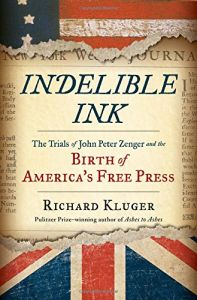Join getAbstract to access the summary!

Join getAbstract to access the summary!
Richard Kluger
Indelible Ink
The Trials of John Peter Zenger and the Birth of America’s Free Press
W.W. Norton, 2016
What's inside?
Richard Kluger, winner of the Pulitzer Prize, details a seminal trial for freedom of the press.
Recommendation
The world has always seen the United States as a bastion of freedom of the press. The First Amendment of the 1789 US Bill of Rights marked the first time in history that a nation made a solemn pledge, in writing, to guarantee free expression as a “fundamental precept of governance.” American freedom of the press traces its legal foundation back to the John Peter Zenger trial in New York in 1735. Pulitzer Prize-winning author Richard Kluger tells the history of the trial, what led up to it and how to understand its significant historic and modern implications. Kluger reports that by 2014, according to Reporters Without Borders, the United States ranked only 46th in the world in press freedom, primarily due to the “Department of Justice’s ‘aggressive prosecution of whistleblowers’ and government security leakers.” getAbstract recommends Kluger’s eloquent account of the landmark Zenger trial and its repercussions to history buffs and everyone concerned about press freedom.
Summary
About the Author
A two-time National Book Award finalist for Simple Justice and The Paper, Richard Kluger won the Pulitzer Prize for Ashes to Ashes, a history of the cigarette industry.

















Comment on this summary